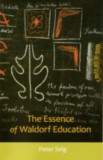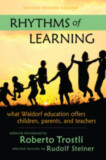- Publisher
SteinerBooks - Published
1st October 1995 - ISBN 9781621483694
- Language English
- Pages 276 pp.
- Size 5.5" x 8.5"
9 lectures, various cities, February 23, 1921-September 16, 1922 (CW 304)
This is the first of two previously untranslated volumes of Steiner's public lectures on Waldorf education. Readers familiar with Steiner's lectures for teachers will discover here how Steiner presented his ideas to the general public with surprising directness.
Teaching, Steiner says, should be artistic, creative, and improvisational—not dogmatic. Nonetheless, he is clear that “the great battle” has to do with the spiritual nature of children. He discusses themes such as understanding the role of health and illness in education, as well as the three major phases in child development: imitation, authority, and freedom.
Also included are also two lectures Rudolf Steiner gave in England on Shakespeare and new ideals in education.
German source: Erziehungs- und Unterrichtsmethoden auf Anthroposophischer Grundlage (GA 304).
TOPICS:
Spiritual Science and the Great Questions of our Present Civilization
Education and Practical Life from the Perspective of Spiritual Science
Knowledge of Health and Illness in Education
The Fundamentals of Waldorf Education
Educational Methods Based on Anthroposophy
Education and Drama
Shakespeare and the New Ideals
Rudolf Steiner
Rudolf Steiner (b. Rudolf Joseph Lorenz Steiner, 1861–1925) was born in the small village of Kraljevec, Austro-Hungarian Empire (now in Croatia), where he grew up. As a young man, he lived in Weimar and Berlin, where he became a well-published scientific, literary, and philosophical scholar, known especially for his work with Goethe’s scientific writings. Steiner termed his spiritual philosophy anthroposophy, meaning “wisdom of the human being.” As an exceptionally developed seer, he based his work on direct knowledge and perception of spiritual dimensions. He initiated a modern, universal “spiritual science” that is accessible to anyone willing to exercise clear and unbiased thinking. From his spiritual investigations, Steiner provided suggestions for the renewal of numerous activities, including education (general and for special needs), agriculture, medicine, economics, architecture, science, philosophy, Christianity, and the arts. There are currently thousands of schools, clinics, farms, and initiatives in other fields that involve practical work based on the principles Steiner developed. His many published works feature his research into the spiritual nature of human beings, the evolution of the world and humanity, and methods for personal development. He wrote some thirty books and delivered more than six thousand lectures throughout much of Europe. In 1924, Steiner founded the General Anthroposophical Society, which today has branches around the world.








